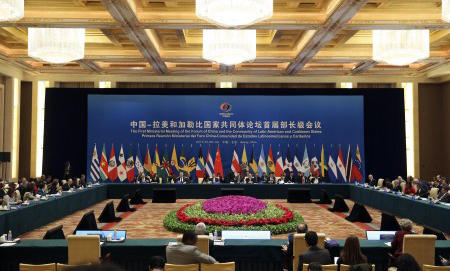China-Latin America relations start a new chapter in history

Manuel Gonzalez Sanz, the minister of foreign affairs for Republic of Costa Rica

Manuel Gonzalez Sanz and other foreign ministers from members of the Community of Latin American and Caribbean States (CELAC) attend the first ministerial meeting of the China-CELAC forum in Beijing from Jan. 8 to 9.
Manuel Gonzalez Sanz (1968- ) was appointed as the minister of foreign affairs for the Republic of Costa Rica in 2014. He graduated from the National University of San Diego in Costa Rica in 1992 and received a law degree from Columbia University in New York in 1995. He has served as an advisor on relations with International financial agencies to the vice-president of Costa Rica from 1992 to 1994, ambassador to the UN and its specialized agencies in Geneva, Switzerland from 2002 to 2004 and minister of foreign trade from 2004 to 2006.
The partnership between China and Latin America not only represents a new chapter for comprehensive cooperation and partnership but also will promote South-South cooperation and exert a significant and far-reaching influence on world prosperity and progress. Recently, a CSST reporter interviewed Manuel Gonzalez Sanz, foreign minister of Costa Rica which holds the rotating presidency of the Community of Latin American and Caribbean States, on issues of China-Latin American cooperation.
CSST: People were surprised by the speed of the China-CELAC forum’s progress from idea into reality. So what kinds of factors do you think have promoted the advance of comprehensive cooperation between China and Latin American nations?
Gonzalez: The advance of comprehensive cooperation between China and Latin American nations is a definitely astonishing process. On July 2014, Chinese President Xi Jinping arrived in Brasilia for a state visit to Brazil and meetings with leaders of Latin American and Caribbean nations. During this period, President Xi initiated a series of cooperation proposals and only a few months later, we came to Beijing to implement the consensus of leaders of China and Latin American nations. There are a lot of reasons to promote the comprehensive cooperation between China and Latin America. But first of all, I want to emphasize that China’s integrity is of great importance. The forum has passed three major documents: the Beijing Declaration, a five-year cooperation plan and the regulations on the China-CELAC forum, which expounded upon the connotation of China-Latin America comprehensive cooperation in detail. These three major documents fully represent that China is a country that keeps its promises. China is a doer not a talker. It will make efforts to achieve what it has promised.
Moreover, objective situations have provided opportunities for both China and Latin America to strengthen their partnership from the angle of the entire regional level. China has developed a good bilateral relationship with many nations in Latin American and Caribbean regions, which laid a solid foundation for advancing China-Latin America comprehensive cooperation.
Let’s take China-Costa Rica relations as an example. Although China and Costa Rica have had established diplomatic ties for only seven years, the bilateral relationship has developed very rapidly. Recently, President Xi Jinping and President Luis Guillermo Solis have announced that China and Costa Rica will establish a strategic partnership with equality, mutual trust and win-win cooperation. This will promote China-Costa Rica relations to a new level.
In a word, the launch of the China-CELAC forum is a good start and then we’ll actively implement these three documents. The new page of China-Latin America comprehensive cooperation has already turned, but our work is just beginning.
CSST: What kinds of opportunities and challenges will Chinese economic transformation contribute to China-Latin America economic and trade cooperation?
Gonzalez: For those countries that depend on exporting bulk commodities, the transformation of Chinese economy might exert a significant influence on them. It is my understanding that China not only imports Latin America’s raw materials but also hopes to import more products with added value and other manufactured products from Latin America. For those countries that depend on exporting raw materials, they should adjust trade structure as soon as possible to diversify the exports to China.
Chinese economic transformation will bring about new opportunities for the development of China-Latin America economic and trade relations. There is no doubt that the huge Chinese market will provide Latin American and Caribbean nations with much more opportunities. From the perspective of Costa Rica, China-Costa Rica economic and trade cooperation has broad prospects, and the market potential is waiting to be explored. As we know, Costa Rica is a unique country in Central America that has established diplomatic ties with China.
Costa Rica’s free trade agreements with other countries can provide convenience for China, and Costa Rica provides a window and platform for China to the Central American market. The tourism industry is the key point in our next stage. We hope to attract more and more Chinese tourists to Costa Rica and to Latin America. We plan to build a consulate in Shanghai, actively study and simplify visa procedures for Chinese visitors to Costa Rica and prepare a direct flight between China and Costa Rica in order to provide convenience for Chinese visitors to Costa Rica. Of course, this work cannot be accomplished in one stroke and needs a process. But everything is progressing on the right track.
CSST: Undoubtedly, economic and trade cooperation is very important, but it only covers one area of China-Latin America relations. But in opening a new chapter of China-Latin America comprehensive and cooperative partnership, what role does cultural and educational exchange play in this relationship?
Gonzalez: China-Latin America cooperation is cooperation beyond the economic dimension, and exchanges and cooperation on a personal level cannot be ignored. China-Latin America cooperation ultimately works for people’s welfare, culture, technology, and sports and other areas are also contained in the cooperation framework.
When people use the same language to communicate, it will narrow the distance among people. Therefore, we attach great importance to promoting Chinese teaching. In Costa Rica, we have built Confucius Institutes, and we genuinely hope more and more Chinese teachers will come to Costa Rica to teach Chinese and in return, more and more Costa Rican students go to China for study. Learning language is just one example of cultural and educational exchange between China and Costa Rica. We will strengthen scientific cooperation among universities between the two countries.
CSST: It is widely believed for the public that the launch of the China-CELAC forum will establish a new model for South-South cooperation. What’s your opinion?
Gonzalez: I completely agree with this. Reviewing the history of international relations, the cooperation between developed and developing countries is unequal with additional conditions. But the development of China-Latin America relations is based on mutual respect. China never imposes their values through force, and China never tells other countries to change their legal systems and political institutions. And that’s the reason why we would like to cooperate with China. Furthermore, we also respect China’s development road, social institutions, cultural traditions and values and ideas. On the basis of mutual trust, China and the 33 member countries of CELAC, regardless of their national power or development level, have concluded the forum with a perfect ending.
CSST: We have noticed that recently some media in the West portrayed China as trying to utilize the forum to carry on the so-called “Latin America Balance” in order to counter the US rebalancing of power in the Asia-Pacific region. What do you think about it?
Gonzalez: I didn’t agree with this opinion. The world is rarely all or nothing. I don’t agree that Latin America needs to make an “either-or” decision on developing China-Latin America relations and developing US-Latin America relations. In fact, the development of China-Latin America relations and that of US-Latin America relations isn’t mutually exclusive but mutual complementary. I’d like to stress again that China-Latin America cooperation with the spirit of openness and inclusiveness doesn’t have the exclusivity. Just like the development of China-Latin America relations does not prevent China from developing friendships with other countries, the development of China-Latin America relations will not prevent Latin America from developing relationships with other countries.
Mao Li is a reporter from the Chinese Social Sciences Today.
